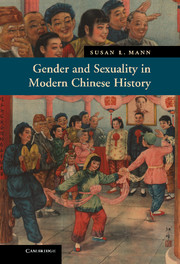Book contents
- Frontmatter
- Contents
- Figures
- Acknowledgments
- Preface: Does Sex Have a History?
- Introduction: The cloistered lady and the bare stick
- Part I Gender, Sexuality, and the State
- PART II GENDER, SEXUALITY, AND THE BODY
- Part III Gender, Sexuality, and the Other
- 7 Same-sex relationships and transgendered performance
- 8 Sexuality in the creative imagination
- 9 Sexuality and the Other
- Conclusion: Gender, sexuality, and citizenship
- Afterword: Gender and sexuality: useful categories of historical analysis?
- Permissions
- References
- Index
8 - Sexuality in the creative imagination
from Part III - Gender, Sexuality, and the Other
Published online by Cambridge University Press: 05 June 2012
- Frontmatter
- Contents
- Figures
- Acknowledgments
- Preface: Does Sex Have a History?
- Introduction: The cloistered lady and the bare stick
- Part I Gender, Sexuality, and the State
- PART II GENDER, SEXUALITY, AND THE BODY
- Part III Gender, Sexuality, and the Other
- 7 Same-sex relationships and transgendered performance
- 8 Sexuality in the creative imagination
- 9 Sexuality and the Other
- Conclusion: Gender, sexuality, and citizenship
- Afterword: Gender and sexuality: useful categories of historical analysis?
- Permissions
- References
- Index
Summary
An image flashes before my mind, and I see her standing in front of me, my nearest, my dearest love – the perfect oval of her face, the high arch of her brows, the limpid gaze, the rosebud mouth, the childhood dimples…and I am driven out of my mind by the sight and left mesmerized, as if in a drunken stupor. Oh, if only we had been destined to spend one night together, a single night, my nearest, my dearest love and I.
Fu Lin, Stones in the Sea (Qin hai shi), 1906 (Hanan 1995:21)Romantic love became one of the most important themes in popular culture as new patterns of family, gender, and sexual relationships began to emerge in twentieth-century Chinese society, which was undergoing tremendous modernization.…As a response to the deeply felt need to address these deeply felt changes, this culture of love in turn discursively shaped popular perceptions and understandings of changing sex and gender relationships.
Jiang Jin (2009:4)As we have seen, romantic love was far from a new theme in twentieth-century China's popular culture. For centuries, the tension between romantic love and arranged marriage supplied endless drama for opera scripts, novels, and short stories. During the Qing period, the Manchus campaigned against eroticism and sensuality in fiction and the theater, in part to enhance their claims to legitimacy. By attacking the “decadent customs” of the former Ming dynasty, the new Qing government presented itself as a regime dedicated to restoring the proper boundaries between men and women and to promoting the Confucian family system and its rituals. To some degree, Qing rectification movements, much like the sweeping anti-rightist campaigns of the Maoist period in the People's Republic, reshaped the content of literary and visual arts. Woodblocks for printing proscribed works were burned along with manuscript copies and published editions, so that many of these books are now known only from titles in bibliographies, or because they made their way into libraries outside of China (Ruan 1991:96–98). Much of the erotic painting and drawing that fills sinologist Robert van Gulik's famous book on Chinese erotica, for example, was copied in Japan, where it survived the Qing purges unscathed (Gulik 1951). Even so, and despite the Manchu court's efforts, fiction and drama from the Qing dynasty open huge windows on romantic love, sexuality, and gender performance under Manchu rule.
- Type
- Chapter
- Information
- Gender and Sexuality in Modern Chinese History , pp. 154 - 168Publisher: Cambridge University PressPrint publication year: 2011



